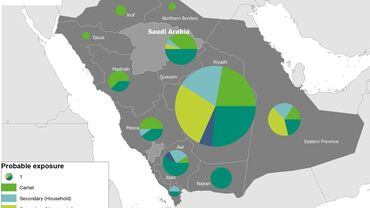Epidemiological update: Middle East respiratory syndrome coronavirus (MERS-CoV), 18 August 2015
Since April 2012, and as of 18 August 2015, 1 449 cases of MERS-CoV, including 551 deaths, have been reported by health authorities worldwide.
Since April 2012, and as of 18 August 2015, 1 449 cases of MERS-CoV, including 551 deaths, have been reported by health authorities worldwide (Figure 1 and Table 1).
Figure 1. Distribution of confirmed cases of MERS by month* and probable place of infection acquisition, March 2012–18 August 2015 (n=1 449)
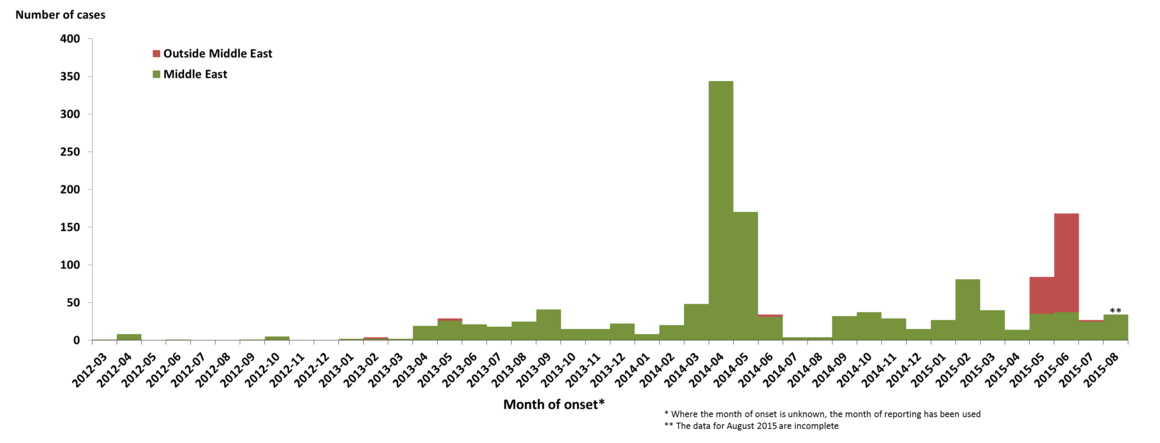
Since the last update of the ECDC Rapid Risk Assessment on MERS-CoV published on 31 July 2015 (including data as of 21 July 2015) 57 new cases and 13 deaths have been reported globally. All these cases and deaths were reported in Saudi Arabia (Table 1).
South Korea has not reported any additional cases since 4 July 2015.
Table 1. Confirmed MERS cases and deaths, by country of reporting, March 2012–18 August 2015
| Reporting country | Cases | Deaths |
| Middle East | 1 236 | 504 |
| Saudi Arabia | 1 105 | 475 |
| United Arab Emirates | 81 | 11 |
| Jordan | 19 | 6 |
| Qatar | 13 | 5 |
| Oman | 6 | 3 |
| Iran | 6 | 2 |
| Kuwait | 3 | 1 |
| Egypt | 1 | 0 |
| Yemen | 1 | 1 |
| Lebanon | 1 | 0 |
| Europe | 15 | 8 |
| United Kingdom | 4 | 3 |
| Germany | 3 | 2 |
| France | 2 | 1 |
| Netherlands | 2 | 0 |
| Greece | 1 | 1 |
| Turkey | 1 | 1 |
| Austria | 1 | 0 |
| Italy | 1 | 0 |
| Asia | 191 | 37 |
| China | 1 | 0 |
| Malaysia | 1 | 1 |
| Philippines | 3 | 0 |
| South Korea | 185 | 36 |
| Thailand | 1 | 0 |
| Rest of the world | 7 | 2 |
| Algeria | 2 | 1 |
| Tunisia | 3 | 1 |
| United States of America | 2 | 0 |
| Total | 1 449 | 551 |
All cases reported from outside the Middle East had either had a recent travel history to the Middle East or could be linked to a chain of transmission originating from a case with a travel history to the Middle East (Figure 2).
Figure 2. Distribution of confirmed MERS cases by probable place of infection acquisition, as of 18 August 2015 (n=1 449)
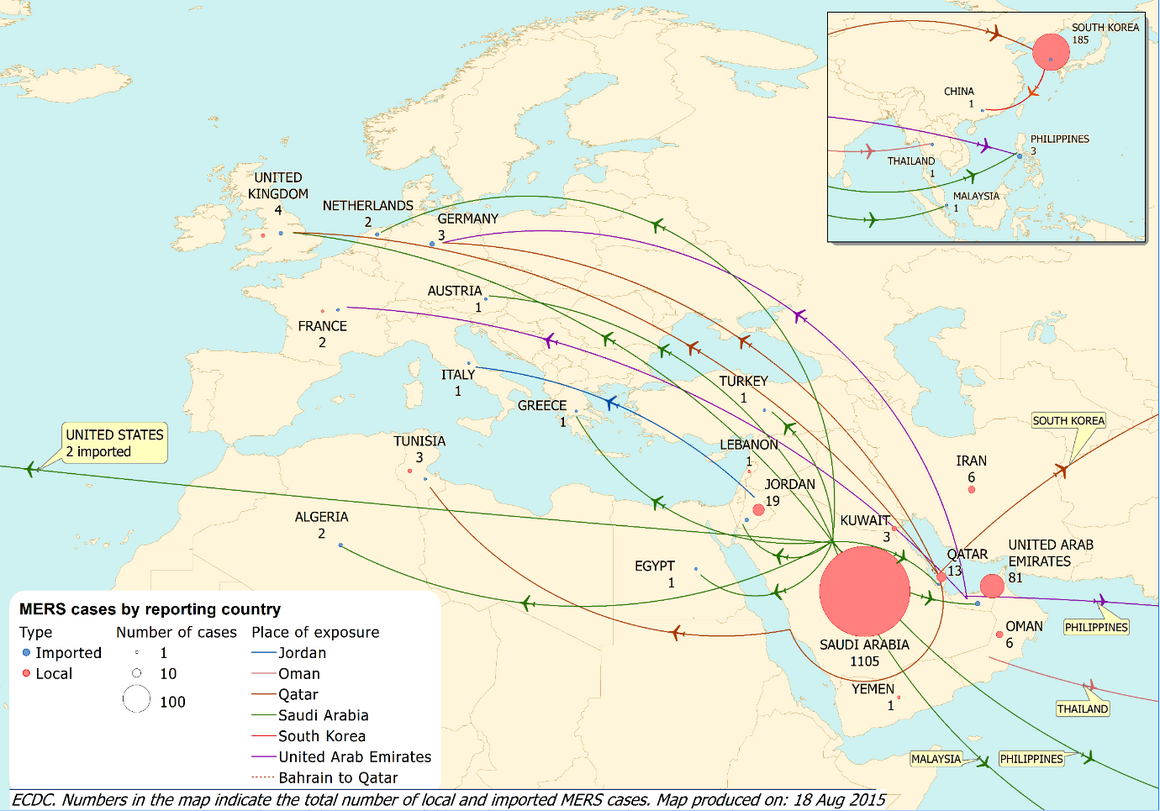
Saudi Arabia
Since the beginning of 2015 and as of 18 August, Saudi Arabia has reported 279 infections with MERS-CoV (Figure 3).
Figure 3. Distribution of MERS cases by reporting city, Saudi Arabia, 1 January–18 August 2015
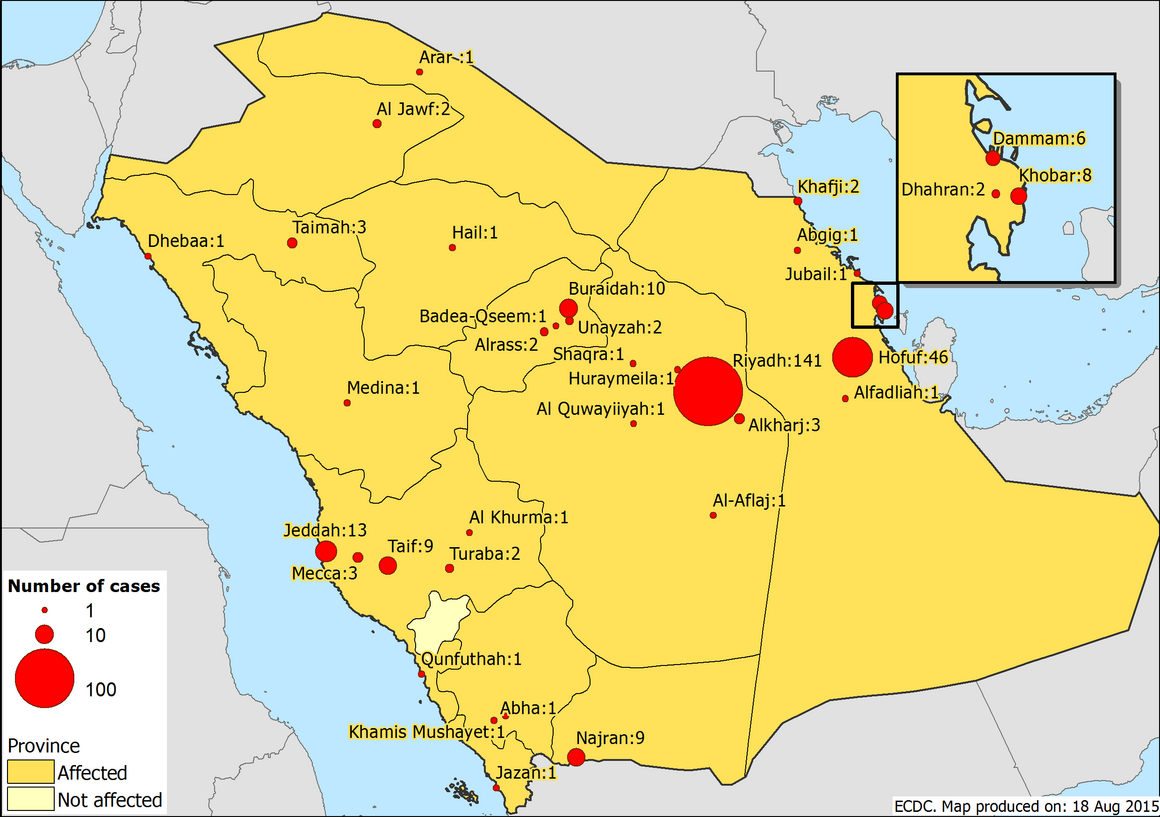
Among the 57 new cases reported by Saudi Arabia since 21 July 2015, 52 (91%) occurred in Riyadh city. The other cases occurred in Rania (one case), Najran (two cases), Alkharj (one case) and Abha (one case). Among these 57 reported cases, four are healthcare workers, including three from Riyadh city.
On 18 August 2015, the Saudi Arabia Ministry of Health confirmed that nine cases reported in Riyadh are linked to a private hospital. According to the health authorities, one of the affected hospitals is the King Abdul-Aziz Medical City for National Guard in Riyadh.
South Korea
On 20 May 2015, South Korea’s Centres for Disease Control and Prevention notified WHO of the first laboratory-confirmed case of MERS-CoV in a 68-year-old man with a recent travel history to the Middle East.
As of 21 July 2015, the South Korean Ministry of Health and Welfare had reported 186 cases since the beginning of the outbreak in South Korea (including the index case and the South Korean case reported by China). Of these, 136 patients have been discharged, 36 patients have died and 14 are still receiving medical treatment. Twelve of the 14 cases under treatment have twice tested negative for MERS-CoV and nine of them are still receiving care in general wards.
The last case from South Korea was reported on 4 July 2015. Transmission can be considered to have ended when no new cases are detected within a 28-day period (twice the maximum 14-day incubation period) of the last case being treated having tested negative twice (with a minimum of 24 hours between the two tests) or the case having died. However, according to media reports, South Korea's health authorities will delay the declaration of the official end of the MERS-CoV outbreak as a 35-year-old patient with underlying conditions is still positive for MERS-CoV.
Figure 4. Distribution of confirmed cases of MERS by date of onset or reporting, South Korea and China, 11 May–18 August 2015 (n=186)
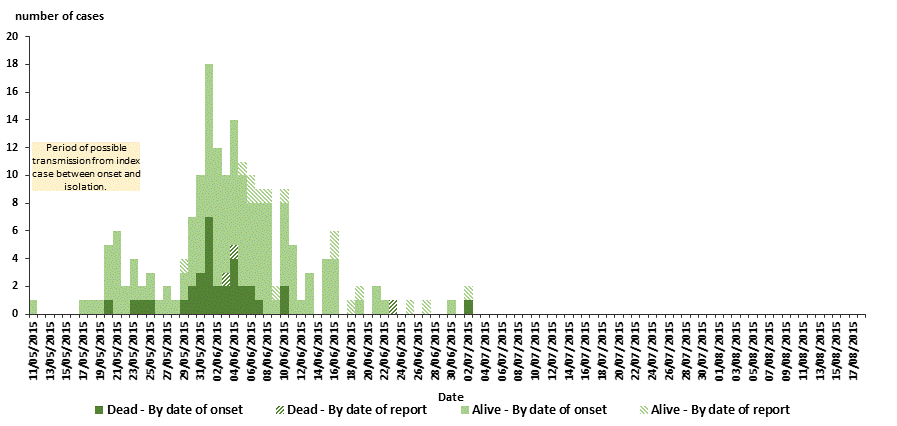
China
On 30 May 2015, WHO reported a case of MERS-CoV in China with probable transmission in South Korea. The case is the son of the third MERS case in South Korea and the younger brother of the fourth MERS case. He visited his father at a time when he was hospitalised in the same room as the index case in South Korea. Later, he travelled from Seoul to Guangdong in China where he was hospitalised and MERS-CoV infection was confirmed on 29 May. No further cases of MERS linked to this patient have been identified to date. According to media sources, the patient was discharged from hospital on 26 June 2015.
Travel advice
Countries should advise travellers returning from all countries affected by MERS-CoV to seek medical attention if they develop a respiratory illness with fever and cough during the two weeks after their return from the affected areas and to disclose their recent travel history to the healthcare provider. Travellers, especially those with pre-existing medical conditions, should be reminded of the importance of good hand and food hygiene, and to avoid contact with sick people. In addition, travellers to the Arabian Peninsula should avoid close contact with camels, visits to farms and the consumption of unpasteurised camel milk, urine or improperly cooked meat.
This year the Hajj falls between 21 and 26 September. Hajj and Umrah travellers with pre-existing medical conditions should be advised to consult a healthcare provider to review the risk before deciding to make the pilgrimage.
Travellers with pre-existing medical conditions should be advised to identify a trusted healthcare facility prior to travel in case of a health emergency during their stay. Travellers who require medical care should minimise contact with other sick people at medical facilities.





